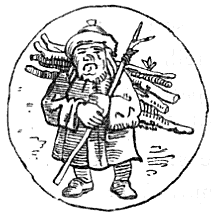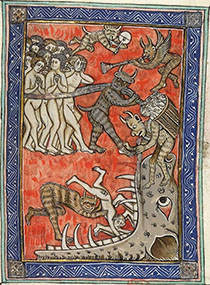|
|
|
|


Mon in the Mone
[MS. Harl. 2253. ff. 114v-115r]
Mon in the mone stond and strit;
On his botforke his burthen he bereth.
It is muche wonder that he na doun slyt;
For doute leste he valle he shoddreth ant shereth.
When the forst freseth muche chele he byd.
The thornes beth kene, his hattren to tereth.
Nis no wyght in the world that wot wen he syt,
Ne bote it be the hegge, whet wedes he wereth.
Whider trowe this mon ha the wey take?
He hath set his o fot his other toforen,
For non highte that he hath ne syght me hym ner shake;
He is the sloweste mon that euer wes yboren.
Wher he were o the feld pycchynde stake,
For hope of ys thornes to dutten is doren;
He mot myd is twybyl other trous make,
Other al is dayes werk ther were yloren.
This ilke mon upon heh, when er he were,
Wher he were y the mone boren ant yfed,
He leneth on is forke ase a grey frere;
This crokede caynard, sore he is adred.
Hit is mony day go that he was here;
Ichot of is ernde he nath nout ysped.
He hath hewe sumwher a burthen of brere;
Thare fore sum hayward hath taken ys wed.
Yef thy wed ys ytake, bring hom the trous;
Sete forth thyn other fot, stryd over sty.
We shule preye the haywart hom to ur hous,
Ant maken hym at heyse for the maystry,
Drynke to hym deorly of fol god bous,
Ant oure dame douse shal sitten hym by.
When that he is dronke ase a dreynt mous,
Thenne we schule borewe the wed ate bayly.
This mon hereth me nout, thah ich to hym crye—
Ichot the cherl is def; the del hym todrawe!
Thah ich yeye vpon heth, nulle nout hye;
The lostlase ladde con nout o lawe.
Hupe forth, Hubert, hosede pye—
Ichot thart amarscled in to the mawe!
Thah me teone with hym that myn teh mye,
The cherld nul nout adoun, er the day dawe.
Man in the Moon
Trans. A. Jokinen
The man in the moon stands and strides;
On his boatfork1 his burden he beareth.
It is a great wonder that he down does not slide;
For fear, lest he fall, he shuddereth and veereth.
When the frost freezeth, much chill he bides.
There's no-one in the world who knows when he sits,
Unless it be the hedge, what clothes he weareth.
Whither, think you, hath this man gone?
He hath set one foot in front of the other,
In any height he's reached, I have never seen him shaken;
He is the slowest man that ever was born.
Where he is in the field, pitching stakes,
In hopes that his thorns2 will block his door;
He must with his twybil3 other twigs make,
Else his whole day's work there is lost.
This same man upon high, whenever he is
Where he was, on the moon, born and bred,
He leans on his fork like a grey friar;4
This stooped sluggard, he is filled with dread.
It is many a day ago that he was here;
I know, in his errand, he has not succeeded.
He hath hewn somewhere a bundle of briars;
Therefore some hayward hath taken his pledge.
If thy pledge is taken, bring home the brushwood;
Set forth thy other foot, stride over the path.
We shall ask the hayward home to our house,
And give him hospitality, in a grand style,
Drink to him heartily of very strong drink,
And our sweet lady shall sit by his side.
When he is drunk as a drowned mouse,
Then we shall get the pledge from the bailiff.
This man heareth me not, though I to him call—
I think the churl is deaf; the devil him rend!5
Though I wail upon the heath, he will not hie;6
The listless lad knows naught of the law.
Hop forth, Hubert, you magpie in a man's clothing—7
I know thou art marshalled into the maw!8
Though I'm so enraged with him that my teeth are gnashing,
The churl won't come down, ere the day dawns.
|
AJ Notes:
1. A boatman's forked stick, now called a pike pole.
2. i.e., that his hawthorn branches will cover his doorway.
3. A twybil, a double-bladed axe.
4. A greyfriar, i.e., a Franciscan monk.
5. Lit. "The devil draw him apart," in the sense of "drawn and quartered"; dismember him.
6. Hurry.
7. Lit. "Hosed magpie", a magpie wearing hose.
8. i.e., "Thou art such a villain, I know the devil will round you up to be led into the hellmouth."


Manuscript image of Harley MS 2253, f. 114v-115r.
 | to Middle English Lyrics |
 | to Luminarium Main |
 | to Middle English Literature |
Site copyright ©1996-2018 Anniina Jokinen. All Rights Reserved.
This page created by Anniina Jokinen on July 3, 2009. Last updated November 20, 2018.
|
|
Middle English Literature
Geoffrey Chaucer
John Gower
Sir Gawain and the Green Knight
William Langland / Piers Plowman
Julian of Norwich
Margery Kempe
Thomas Malory / Morte D'Arthur
John Lydgate
Thomas Hoccleve
Paston Letters
Everyman
Medieval Plays
Middle English Lyrics
Essays and Articles
Sciences
Medieval Cosmology
Historical Events and Persons
Hundred Years' War (1337-1453)
Edward III
Edward, Black Prince of Wales
Lionel of Antwerp, Duke of Clarence
John of Gaunt, Duke of Lancaster
Edmund of Langley, Duke of York
Thomas of Woodstock, Gloucester
Richard of York, E. of Cambridge
Richard II
Henry IV
Edward, Duke of York
Henry V
Thomas, Duke of Clarence
John, Duke of Bedford
Humphrey, Duke of Gloucester
Catherine of Valois
Charles VII, King of France
Joan of Arc
Louis XI, King of France
Charles the Bold, Duke of Burgundy
The Wars of the Roses (1455-1485)
Causes of the Wars of the Roses
The House of Lancaster
The House of York
The House of Beaufort
The House of Neville
Henry VI
Margaret of Anjou
Richard Plantagenet, Duke of York
Edward IV
Elizabeth Woodville
Edward V
Richard III
George, Duke of Clarence
More at Encyclopedia and at
Additional Medieval Sources
|
|